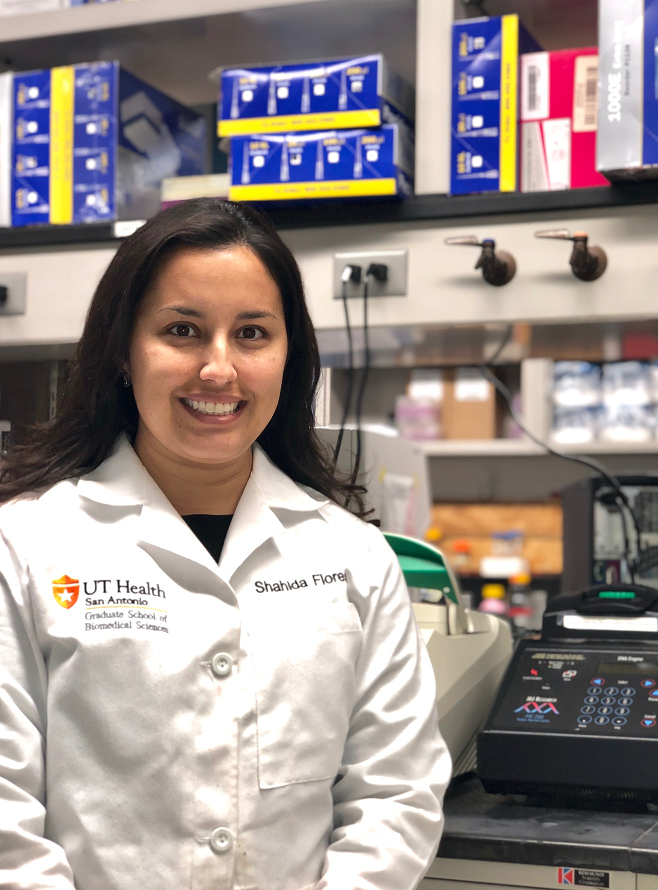Shahida Flores Receives F31!

 Shahida Flores, a student in the Cell Biology, Genetics & Molecular Medicine discipline of the Integrated Biomedical Sciences Ph.D. program has just received an individual National Research Service Award (F31 fellowship) funded by The National Institutes of Health/The National Institute of General Medical Sciences.
Shahida Flores, a student in the Cell Biology, Genetics & Molecular Medicine discipline of the Integrated Biomedical Sciences Ph.D. program has just received an individual National Research Service Award (F31 fellowship) funded by The National Institutes of Health/The National Institute of General Medical Sciences.
Her research in the lab of Dr. Patricia Dahia focuses on understanding the function and regulation of a poorly known tumor suppressor TMEM127 which her lab has identified as a susceptibility gene in hereditary neuroendocrine tumors called pheochromocytomas.
According to the National Organization for Rare Disorders, pheochromocytomas are rare tumors that arise in the adrenal glands which are located above the kidneys. Symptoms of pheochromocytomas include high blood pressure, headaches and profuse sweating. Approximately 40 percent of all cases of pheochromocytomas are inherited in an autosomal dominant fashion, resulting from mutations in a number of susceptibility genes, such as TMEM127, EPAS1 and others.
Shahida is interested in understanding the role of patient-derived variants in these susceptibility genes. One of her approaches involves functionally characterizing patient-derived TMEM127 variants based on their subcellular localization and stability. She is also investigating mechanisms of internalization and trafficking of TMEM127.
According to the Genetics Home Reference, The TMEM127 gene provides instructions for making a protein that acts as a tumor suppressor protein, which means it prevents cells from growing and dividing too quickly or in an uncontrolled way. The TMEM127 protein controls a signaling pathway that leads to cell growth and survival. Research shows that this pathway, regulated by a protein complex called mTORC1, is blocked (inhibited) by the TMEM127 protein, although the specific action of the TMEM127 protein is unknown. The mTOR pathway is frequently dysregulated in a number of human diseases including cancer.
“My research has both basic and translational impact. By characterizing novel features of this tumor suppressor and lysosomal membrane protein we will be able to better understand its physiological role, which our previous studies have demonstrated involves the negative regulation of mTOR signaling. Additionally, majority of TMEM127 variants identified through genetic screening are listed as Variants of Uncertain Significance – my work involving patient-derived TMEM127 variants will help in predicting pathogenicity which has direct benefit to patients and their families.”
Earlier this year, Shahida was a co-first author paper in the article, “EPAS1 Mutations and Paragangliomas in Cyanotic Congenital Heart Disease” in The New England Journal of Medicine, describing her findings of other patient-related mutations. She is also a predoctoral trainee on our institutional NCI-funded National Research Service Award (T32 training grant) and an associate of the Initiative on Maximizing Student Development (IMSD) program, a National Institute of Health student development program to increase the number of students from underrepresented groups in biomedical research at research-intensive environments.
“I am deeply honored to be a recipient of a Ruth L. Kirschstein Predoctoral Individual NRSA (F31). This was a significant career goal (and achievement) of mine. Of course, one of my favorite sayings is “If I have seen further, it is by standing upon the shoulders of giants,” so I have to thank my mentor, Dr. Patricia Dahia, all my current and former lab members, and many other members of the UT Health San Antonio community for all their support and guidance thus far.”
Shahida will continue working on the experiments proposed under the F31 application and hopes to submit a manuscript based on her work in the next few months.
